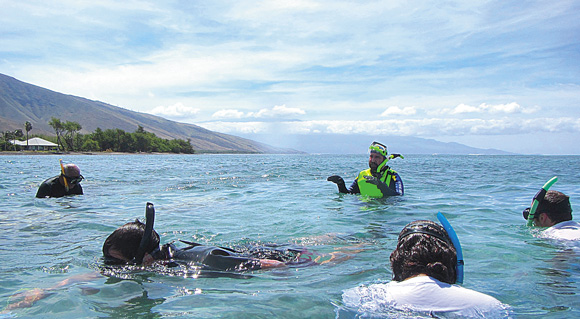NCCOS supported researchers led a May 2015 training event wherein local community members learned to use coral reef ‘forensics’ on reef plants and animals. This activity identified and provided early warning of coral reef stress, death and decay causes. The event, hosted by the citizen conservation group Maui Nui Marine Resource Council on the Hawaiian Island of Maui, featured NCCOS sponsored project lead scientist, Dr. Robert Richmond. The ground-breaking training gathered adversarial groups such as developers, scientists, teachers, cultural leaders, students, ocean activity operators, a representative from the Hawaii Department of Aquatic Resources, and other community stakeholders from around Maui. Held at Maui’s Olowalu Reef, one of Hawaii’s most unique ocean reef systems, over 30 participants attended the training.

Identification of forensic biomarkers allows scientists and managers to detect stress at early stages, before corals die. The early detection also provides opportunities for local management actions to try and save the animals and plants that reside on coral reefs. NCCOS believes these types of sponsored studies will benefit stakeholders from across the Pacific; this in turn enables preservation and restoration of coral reef ecosystems.
This stakeholder training based on science results is an example of how NOAA research is helping drive a paradigm shift in how natural resources are managed in the Pacific Islands. Local residents are increasingly participating in the management of natural resources, returning to the traditional Polynesian model of decentralized resource management where local residents have more involvement and influence over the fate of the natural environment in their own communities.
For more information, contact Felix.Martinex@noaa.gov.
